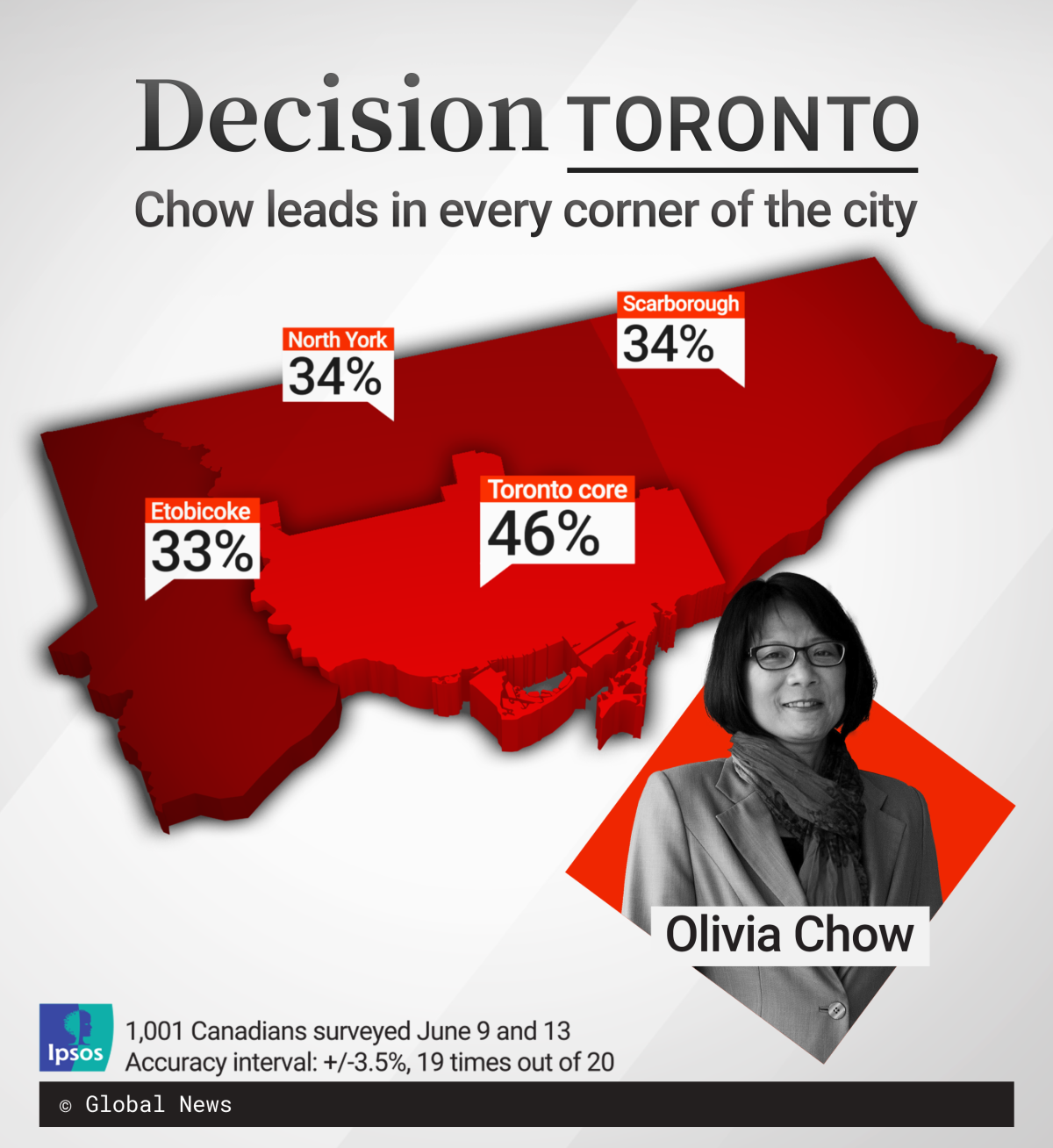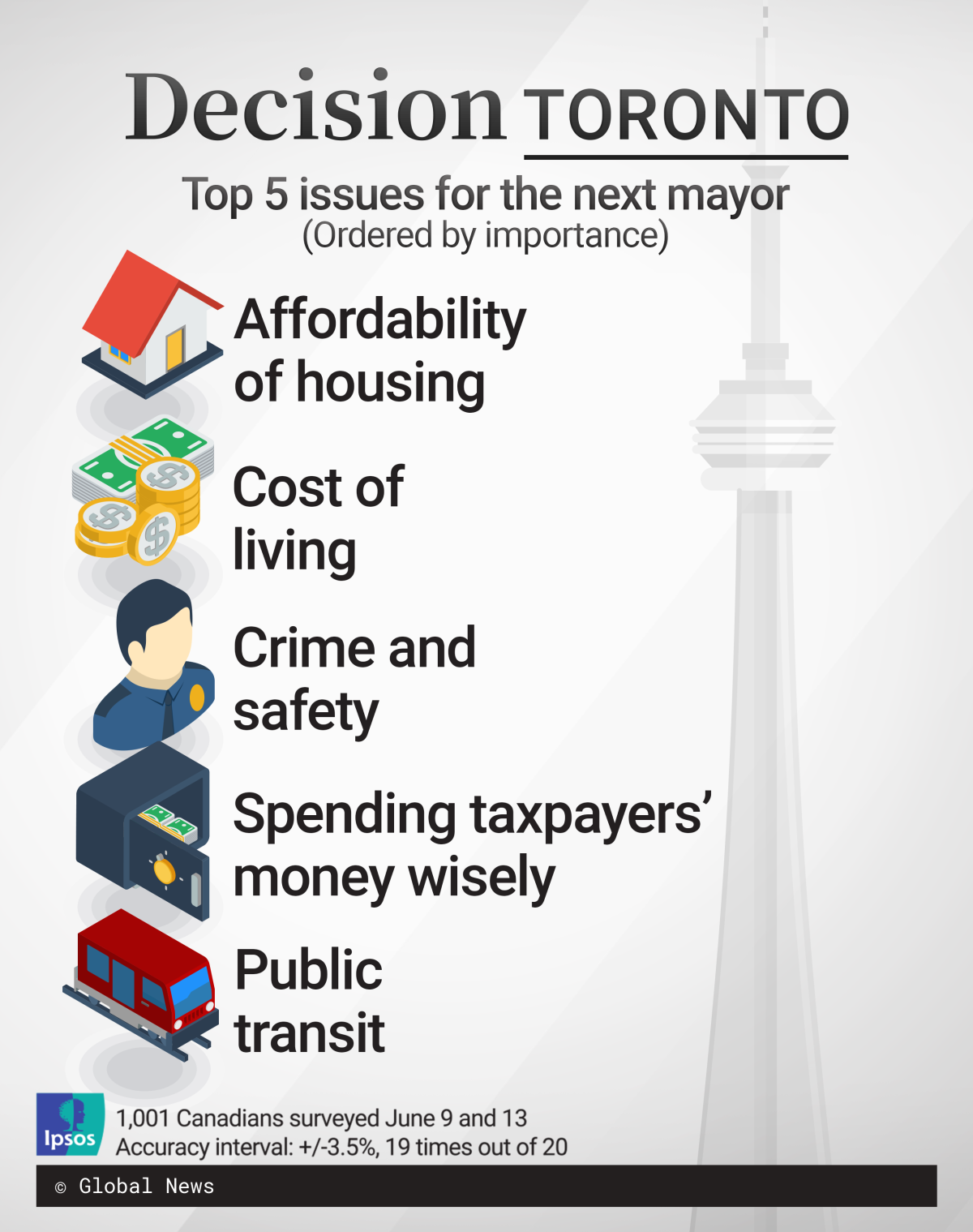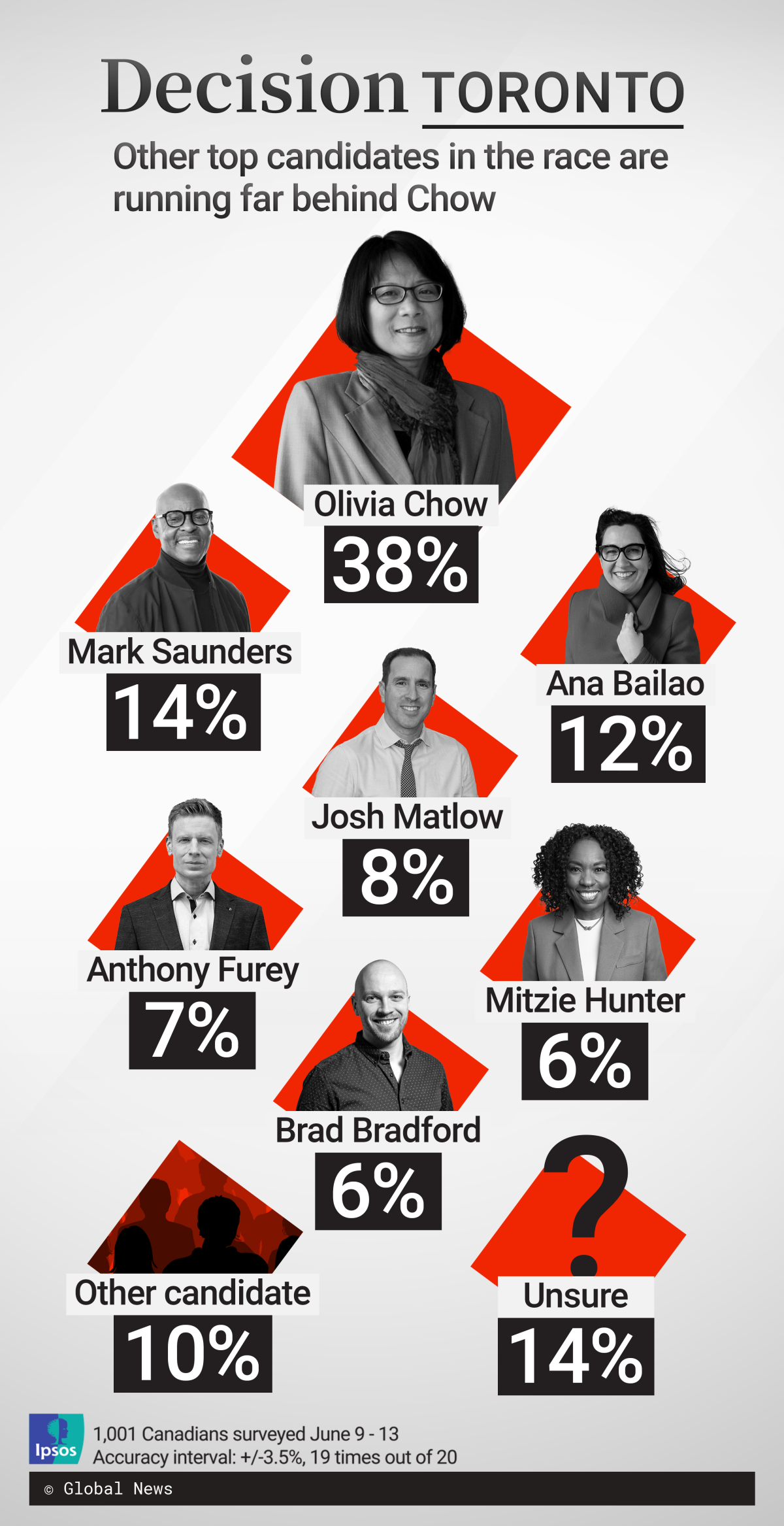The race to become Toronto’s next mayor is frontrunner Olivia Chow’s to lose as she enters the final stretch of the campaign with a seemingly unassailable lead, a new Ipsos poll conducted exclusively for Global News and the Toronto Star suggests.

The polling, completed between June 9 and June 13, shows Chow well in front of every other candidate in the race as voting day draws closer.
If the election was held tomorrow, Chow would take 38 per cent of the popular vote, the poll found. That’s well ahead of Mark Saunders in second place with 14 per cent and Ana Bailão with 12 per cent.
The other candidates would get less than 10 per cent of the popular vote each. The poll found support at: Josh Matlow (eight per cent), Anthony Furey (seven per cent), Mitzie Hunter and Brad Bradford (both six per cent).
Ten per cent of eligible voters would vote for another candidate not mentioned and 14 per cent remain undecided.
“Unless something really untoward happens this week, this really is Olivia Chow’s election to lose,” Global CEO of Ipsos Public Affairs Darrell Bricker told Global News.
“In the time I’ve been doing this type of work, over the last 35 years, I don’t think I’ve seen anybody with such a lock on an election as I see with Olivia Chow in this particular election.”
The strength of Chow’s lead
The poll found strong support for Chow in several different areas. The former NDP MP and councillor polls as the top candidate across the city, on key issues and in key demographics.
Support for Chow is at its highest in the historical City of Toronto, where 46 per cent of those polled said they would vote for her. That number is 33 per cent in Etobicoke, 34 per cent in both North York and Scarborough.
Chow also has strong support among young voters, university educated voters and households with an annual income over $100,000. Renters (45 per cent) also show stronger support than homeowners (34 per cent) for the frontrunner.
She recorded high support on top issues for voters during the next mayoral term.
On housing and affordability, for example, the poll shows 35 per cent think Chow would be the best candidate to handle the job, compared to Bailão (10 per cent), Hunter and Matlow (both eight per cent), Saunders (seven percent), Furey (five per cent) and Bradford (four per cent).
Of the top five issues for Toronto voters, Chow leads in everything apart from crime and safety, where Saunders, the former police chief, is preferred by 36 per cent compared to her 18.
So strong is Chow’s lead, the poll suggested, that even if all 14 per cent of undecided voters coalesced around one candidate, she would still win the race.
Despite the strong lead, Chow could still find herself with a smaller mandate than others mayors, if she wins.
The medley of other major candidates taking portions of the popular vote mean Chow could win the election with the smallest popular mandate since the City of Toronto amalgamated in 1998. Her current polling at 38 per cent would leave her two points shy of the 40 per cent John Tory recorded when he beat Doug Ford to the mayoralty in 2014.
“There’s no consensus as to who the alternative candidate should be,” Bricker said.
“Basically, you have Olivia Chow sitting at 38 per cent and then you’ve got a whole lot of other candidates either sitting in single digits or low double digits, and you just can’t compete from there.”
Saunders in second
The poll found that Saunders’ attempts to position himself as the alternative to Chow worked to the extent that he would finish second if the election were held tomorrow, but not enough to mount a serious challenge.
Support for the former police chief is strongest in the edges of the city and weaker in the former City of Toronto at just eight per cent. The poll suggested he would enjoy 19 per cent of the popular vote in North York, 18 per cent in Etobicoke and 16 per cent in Scarborough.
His support is also stronger with men (17 per cent) than women (12 per cent). People aged 35 to 54 and those born outside Canada also showed some support for Saunders’ campaign, though he remains behind Chow among those demographics.
- South Africa celebrates 30 years since end of apartheid, but discontent grows
- Grocery code: How Ottawa has tried to get Loblaw, Walmart on board
- Alberta to overhaul municipal rules to include sweeping new powers, municipal political parties
- Military judges don’t have divided loyalties, Canada’s top court rules
“Usually what happens in these election campaigns is you end up with two very serious candidates: one who represents downtown and tends to be more progressive and somebody who represents more of a conservative point of view,” Bricker said.
“In this instance, what’s happened is the downtown constituency has really coalesced around Olivia Chow … but then there’s nobody else that even competes with her in the suburbs. As a result of that, she’s strong enough but not as strong as we’ve seen with (other candidates) in previous mayoralty campaigns.”
Loyalty to Chow from other campaigns is also undermining attempts to position Saunders as the only viable alternative. The poll found that if voters weren’t able to vote for their first choice, Chow would be the most popular second choice candidate at 13 per cent, followed by Matlow (12 per cent), Bailão (11 per cent) and Saunders (11 per cent.)
The other second choice preferences saw Bradford and Furey both poll at five per cent, though almost 30 per cent of those asked weren’t sure who their second choice would be.
Affordability top of mind for voters
As house prices in Toronto stay high and rent soars, the Ipsos poll shows housing and affordability are the top issue for voters. The second priority is the cost of living, followed by crime and safety. Forty-six per cent of those polled listed housing affordability as their top issue, with 38 per cent selecting cost of living and 30 per cent choosing crime and safety.
Fourth on the average voter’s mind was spending taxpayer money wisely, with public transit rounding out the top five priorities, according to Ipsos.
On four of the five top priorities, Chow holds a commanding position of between 27 and 35 per cent, with Saunders leading on crime and safety. For the top two issues — housing and affordability and cost of living — the poll shows 35 and 29 per cent of voters think Chow would be the best candidate to handle the issues. No other candidate polls above 11 per cent on those topics.
A range of other issues were polled by Ipsos. In order of priority for voters, they were: homelessness, controlling taxes, traffic congestion, economy and jobs, city finance and budget, social services and fighting climate change.
Even on topics her opponents have attacked her on, Chow appears strong.
For example, Saunders has regularly warned voters about how he believes property taxes would increase under a Chow mayoralty. The polling, however, shows that 23 per cent of voters would pick Chow on controlling taxes, compared to 11 per cent for Saunders and 10 per cent for Bailão. A total of 29 per cent of those polled on the question of controlling taxes did not know who would be their preference.
“Normally, one of the old maxims of election campaigns is find an issue and make it your own,” Bricker said.
“What (Chow) has done is she’s really vectored in on the questions of housing affordability and the cost of living in Toronto in general. And she’s way, way ahead of her opponents on both of those issues; on the two big issues people care the most about, she’s way ahead.”
METHODOLOGY: This Ipsos poll was conducted between June 9 and June 13 on behalf of Global News and the Toronto Star. For this survey, a sample of n=1,001 Toronto voters aged 18+ was interviewed online and by phone. Quotas and weighting were employed to balance demographics to ensure that the sample’s composition reflects that of the adult population according to census data and to provide results intended to approximate the sample universe. The precision of Ipsos polls which include non-probability sampling is measured using a credibility interval. In this case, the poll is accurate to within ± 3.5 percentage points, 19 times out of 20, of what the results would be had all Torontonians been polled. All sample surveys and polls may be subject to other sources of error, including, but not limited to coverage error, and measurement error.












Comments